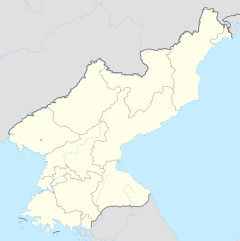| Kangdong concentration camp | |
| Chosŏn'gŭl | 강동 제4호교화소 |
|---|---|
| Hancha | 江東第四號敎化所 |
| Revised Romanization | Gangdong Je4ho Gyohwaso |
| McCune–Reischauer | Kangdong Che4ho Kyohwaso |
| Chosŏn'gŭl | 강동 정치범 수용소 |
| Hancha | 江東政治犯收容所 |
| Revised Romanization | Gangdong Jeongchibeom Suyongso |
| McCune–Reischauer | Kangdong Chŏngch'ibŏm Suyongso |

| Part of a series on |
| Human rights in North Korea |
|---|
 |
| Human rights abuses |
| Political prisons (Kwanliso) |
| Re-education camps (Kyohwaso) |
| Abductions and POWs |
| International reactions |
Kangdong concentration camp (also spelled Gangdong) is a reeducation camp in North Korea. The official name of the camp is Kyo-hwa-so No. 4 (Reeducation camp no. 4).
The camp consists of a large prison compound situated between Samdung-ri and the Nam River, in Kangdong-gun, in South Pyongan province of North Korea, about 30 km (19 mi) east of downtown Pyongyang.
The main section of the camp is around 250 m (820 ft) long and 200 m (660 ft) wide, surrounded by a high wall. The whole camp is roughly 2 km (1.2 mi) long by 1.5 km (0.93 mi) wide, surrounded by a barbed-wire fence. In 1997 there used to be around 7,000 prisoners. Most of them are either soldiers or residents of Pyongyang, sentenced from 5 to 20 years. Working facilities include a cement factory, a coal mine, a limestone quarry, a glass factory and some agriculture.
Human rights situation
According to a former prisoner, an average of 500 prisoners die annually, mostly due to waterborne illnesses. Another former prisoner reported high death rates due to work accidents, malnutrition, and disease. Seriously ill prisoners are sent home on sick leave to reduce the apparent number of deaths in detention. In the limestone quarries the prisoners have to do hard labor in hazardous conditions, with prisoners often receiving or sustaining chest ailments and lung diseases from limestone dust. Moreover, as the prisoners are rarely allowed to wash their faces, many suffer from skin abrasions and infections. Prisoners live in unsanitary conditions; they sleep on the floor in groups of 50 to 100 people, without bathing or changing their clothes. Food rations consist of only 50 g (2 oz) of corn and wheat and some cabbage soup per meal and all prisoners are seriously underweight. A former prisoner witnessed eight public executions during the eight months he was held in the camp. Rule violations are punished with reduced rations, extended sentences, and detainment in very small punishment cells. There is a criticism session every week, in which the prison officials criticize prisoners in front of a large group of prisoners.
See also
References
- ^ "The Hidden Gulag – Exposing Crimes against Humanity in North Korea's Vast Prison System (p. 226)" (PDF). The Committee for Human Rights in North Korea. Archived from the original (PDF) on December 14, 2019. Retrieved September 14, 2012.
- ^ "The Hidden Gulag – Exposing Crimes against Humanity in North Korea's Vast Prison System (p. 109)" (PDF). The Committee for Human Rights in North Korea. Archived from the original (PDF) on December 14, 2019. Retrieved September 14, 2012.
- "Prisoners in North Korea Today" (PDF), Database Center for North Korean Human Rights, 1.3.5 Prisons (p. 70), July 15, 2011, archived from the original (PDF) on March 5, 2014, retrieved June 5, 2012
- "Prisoners in North Korea Today" (PDF), Database Center for North Korean Human Rights, 1.3.5 Prisons (p. 101), July 15, 2011, archived from the original (PDF) on March 5, 2014, retrieved June 5, 2012
- "Prisoners in North Korea Today" (PDF), Database Center for North Korean Human Rights, 6.2.3 Working Facilities and Productions (p. 390), July 15, 2011, archived from the original (PDF) on March 5, 2014, retrieved June 5, 2012
- "Prisoners in North Korea Today" (PDF), Database Center for North Korean Human Rights, 6.2.2 Medical Facilities (p. 375), July 15, 2011, archived from the original (PDF) on March 5, 2014, retrieved June 5, 2012
External links
- Committee for Human Rights in North Korea: The Hidden Gulag Archived 2019-12-14 at the Wayback Machine - Overview of North Korean prison camps with testimonies and satellite photographs
- Database Center for North Korean Human Rights: Prisoners in North Korea Today - Comprehensive explanation of detention facilities in North Korea based on numerous defector testimonies
| Prison camps of North Korea | ||
|---|---|---|
| Political prison camps (Kwalliso) | ||
| Reeducation camps (Kyohwaso) | ||
39°00′32″N 126°09′13″E / 39.00878°N 126.15369°E / 39.00878; 126.15369
Category: